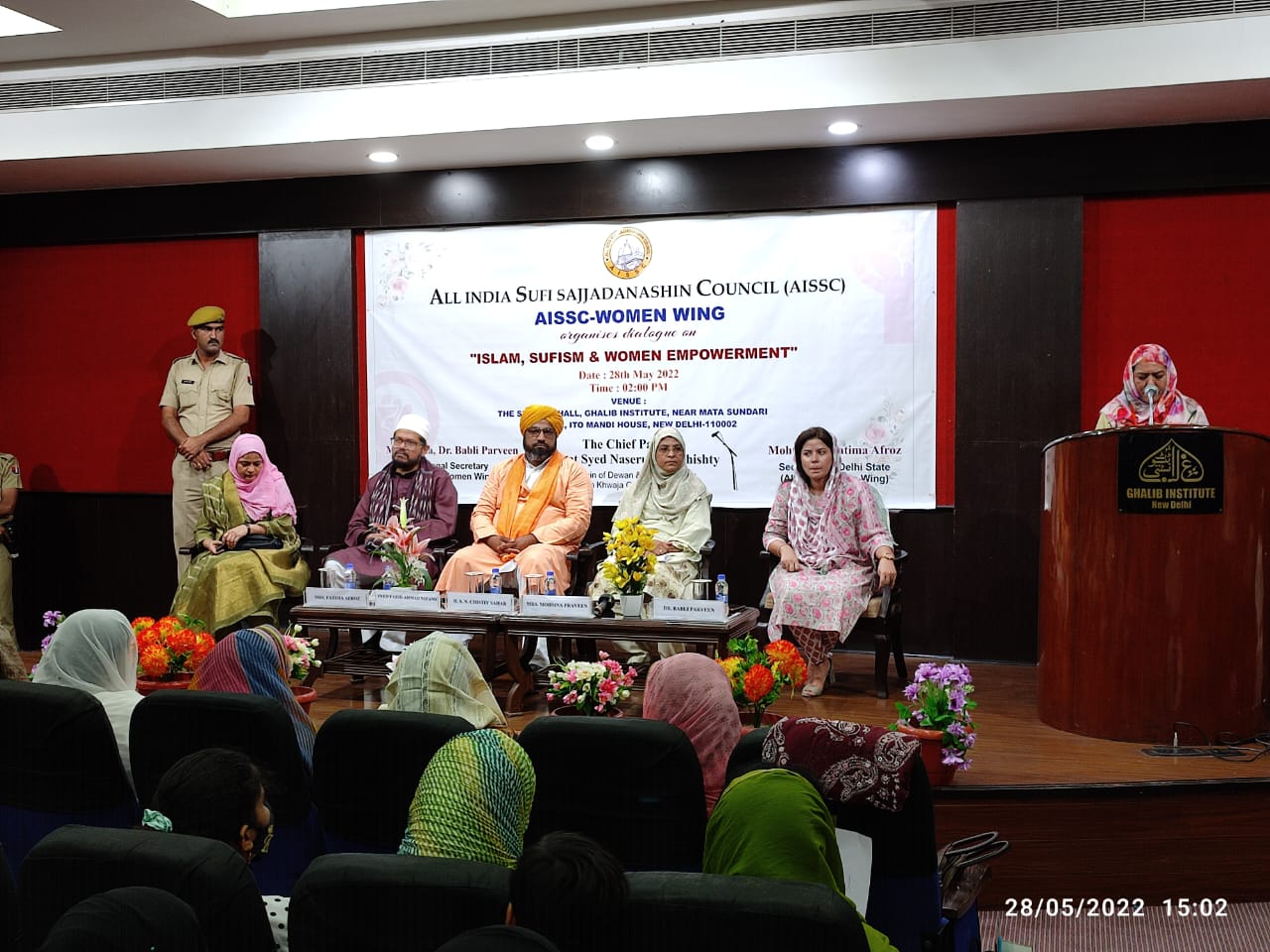
Syed Naseeruddin Chishti The Chairman of All India Sufi Sajjada Nashin Council & Janashin of Sajjadanashin Ajmer Dargah, addressed the speakers and audience at "Islam, Sufism and Women empowerment" event on 28.5.2022 at Ghalib Institute, ITO, New Delhi. The event has been organized by the Women Wing of AISSC.
The idea of this event was to have a dialogue to spread the message of social harmony with the reference of Sufism and in addition to talk about the women empowerment that what all we could do to make the position of women in India more powerful and to enable them with the skills so they can live with dignity and equality.
The chairman emphasized on bringing women forward in the society. To work for the Muslim women empowerment at ground level through this council. He also spoke about Sufi education which gives us the message of peace, brotherhood and love, which is not being implemented properly in this era. The efforts started at the grassroots level, in which the contribution of women is also very important, which only women can do because the first teacher (guru) of the children is a woman, in the form of a mother, only she can give the right education to her children. And from that there can be a good improvement in the society.
He said How do we expect the world to grow when the decision-makers in our patriarchal society are only men? And they are making decisions on behalf of women without even comprehending or even beginning to understand the struggles in a woman’s life.
When a society as a whole has to be improved, empowering the women is a must.
Islam has laid down excellent rights for the women which ultimately leads to their empowerment.
Islam recognizes “Right to education “. It doesn’t differentiate between men and women in gaining knowledge and education. In fact, it commands everyone to get education in every sphere of life.
The first institution created for the masses in Islam was a School (Centre for gaining knowledge) and later on a Mosque.
Quality Education is the key to women’s empowerment. Slowly with the increase in literacy level and awareness, society has started giving importance to education. Many parents today want to educate their daughters equally as their son. Many women today are scientists, lecturers, collectors, etc.
Islam gives the liberty and right to the women in choosing her matrimonial partner. Unless and until she openly expressed her approval in front of the witnesses, Nikah cannot be solemnised. She can fix at the time of Nikah , Mehr amount , conditions to be followed after the Nikah and can also fix conditions to be followed in case of divorce.
This is a classic case of Women empowerment in Islam.
Islam recognizes the “ Right to Life and Liberty “. Women is empowered to lead a good life and have the liberty to have her say in many things.
Islam encourages Nationalism.
It teaches one to be loyal to the nation where he or she lives and to follow its laws.
As we all know women are about half the population in the world. Even with such an acute understanding and knowledge, the sad reality prevails. In society and the world in which we live, women are often not given any part or role to play the decision-maker role in many professions.
The basic aim of Sufism is to promote peace, Love and harmony among human beings. It doesn’t differentiate between gender and caste in its teachings. Mission of Peace, love and harmony cannot be achieved unless the women are given their due respect and empowerment.
The object of conducting this conference by AISSC is to highlight the importance of women empowerment in achieving peace in the society and country in general.
The names of the participants are as below:-
1. Janab Farid Ahmed Nizami Sahab, Naib Sajjadanashin Dargah Nizamuddin Aulia, Delhi
2. Janab Wahid Pasha Sahab, National Coordinator AISSC
3. Chief Guest Respected Mohsina Parveen Sahiba The Member (Equal to Judge) Muslim law and Jurisprudence Telangana state Waqf Tribunal Hyderabad
4. Program Speakers Prof. Sabiha Hussain, The Director (Sarojini Naidu centre for women’s studies) Jamia Millia Islamia, New Delhi,
5. Dr Naima Jafri Pasha (Eminent author and scholar)
6. Bushra Alvi Razzack Sahiba (Delhi based freelancer writer, editor & academician)
7. Dr. Shahina Tabassum, Associate professor of urdu Zakir Husain Delhi college (E) University of Delhi
8. Sr. Babli Parveen (Historian, Author and Asst. Professor-DU)
9. Fatima Afroz Sahiba, The Director (Abhigyan IAS Academy, New Delhi)